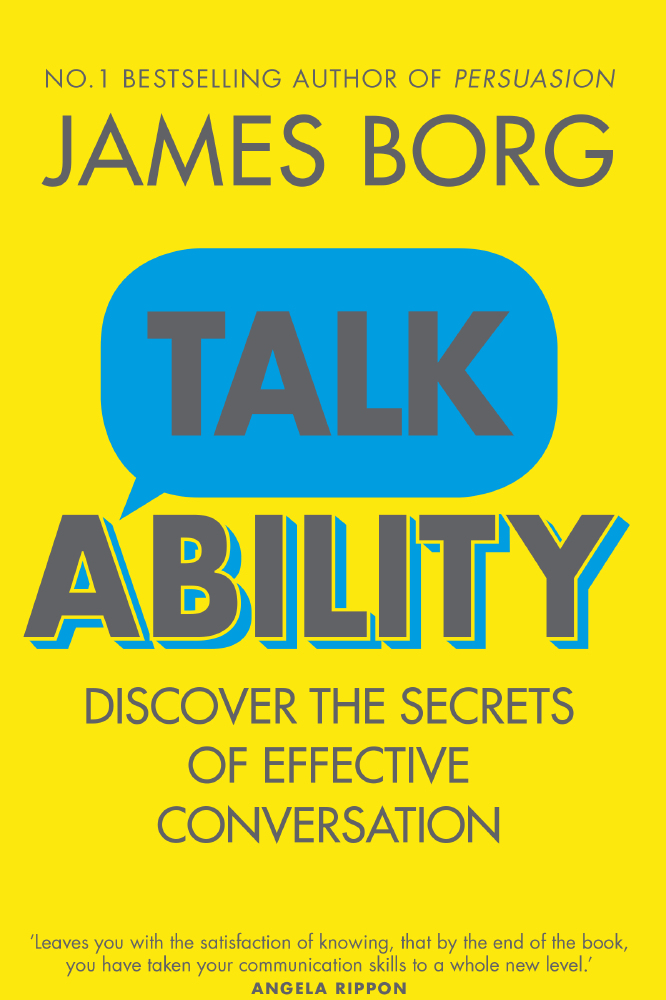by international bestselling author and communications expert James Borg

Talkability
"Life's greatest happiness is to be convinced we are loved."
VICTOR HUGO
For any relationship to be successful, the two of you have to be equal and respectful of each other. Words have the power to promote harmony but also to hurt and cause emotional scars.
We're all human and so from time to time, during tense moments, the wrong words slip out. Equally, at other times, in an effort to be plain speaking and honest, we'll talk to our partner without paying adequate regard to their feelings.
Say what you do want in your relationship, rather than what you don't want (and try and avoid 'absolutes')
It's inevitable that we find it easier to think of our existing circumstances and rattle off what we don't want in our relationships.
We could tell the friend, relative, counsellor or whoever all the things that are creating distance in the relationship. But if asked what we do want - and whether we've told our partner so - we often find it a difficult question to answer.
As relationships progress, there's a heap of - if we're totally honest with ourselves - annoying things relating to how our partner communicates or behaves. As a result, it's easier to say:
"You never think to take the rubbish out unless I force you."
"You never remember anything."
"I always have to be the one to suggest we go out for a meal."
"Why can't you be more proactive like Jane's husband?"
Notice that all of these statements invite defensiveness, from your partner. In addition they contain those irritating 'absolutes' - never, always.
Is it true that they never ever remember anything?
You're always the one that has ever suggested something?
This invites even more defensiveness and ruins the point of the original complaint.
We also have the use of those two 'tinder keg' three letter words - you and why. Two accusatory words that always make matters worse.
If you said what you want, your phrasing would be along the lines of:
"I'd feel less bad about things if you could remember to take the rubbish out from time to time, it would be really helpful."
"If you could suggest going out for a meal, as you used to do, I'd enjoy it better."
Try and anticipate misunderstandings (by cutting out the 'shorthand')
It's inevitable when we're dealing with words, that sometimes what you say to your partner will be taken the wrong way.
"It's better if you don't wear that close fitting shirt, wear the looser one, that blue one."
Tom takes offence ("Alice thinks I look unattractive, because of my slight paunch. I don't think I look too bad in it. . ." he thinks).
Result: blue shirt comes out of the wardrobe and Tom storms off into the other room and for the next hour any responses are either monosyllabic or in the vein of: "I'm sorry I haven't got the Tom Cruise torso to please you."
What Alice actually was thinking was that because he was going to have to do some lifting of boxes up a few flights of stairs, when they got to their destination, he would be more comfortable wearing the other shirt (and less chance of her having to sew buttons!). Had she said that, the interchange would have been different: "Better to wear your blue shirt, I think. It's looser - you've got those boxes to cart up those steep flights of stairs."
"Yes, that's true - more sensible I suppose."
Instead, she had to spend time afterwards calming her husband down and explaining what the reason for her comment was - and experiencing the frustration that you inevitably endure, when your partner doesn't understand.
We all inevitably speak in 'shorthand' sometimes without explaining what we mean - think carefully as to whether you could be misunderstood. When we've been together with somebody for a while, there's the temptation to speak in this way. But as in the example above, it can cause problems.
If you're on the receiving end of a comment (and take offence) and then find out that your partner meant something totally different to how you perceived it - let it go. Don't let the misunderstanding grow bigger.
Make sure you give the gift of listening
When you hear what causes dissatisfaction in relationships it's usually:
- "we don't talk/or "I don't like the way he/she talks to me"
and/or
- "he/she doesn't listen".
Well, between talking and listening, that doesn't leave much else, does it? That sums up relationships!
So make sure you listen to your partner. We all want to be listened to - even if our conversation isn't scintillating! Even more so during disagreements. Telling the other person to "calm down" during times of friction only makes the other person feel angrier. Try to show more understanding and listen. Then make your point.
I'll sign off with the words of my favourite female vocalist of all time the late, great, Karen Carpenter. As one of her greatest fans, I'm still captivated by that heavenly voice. Song lyrics can teach us so much, and the lyrics of so many of her melancholy, wonderful romantic songs tell us so many truths. Like this refrain, which says it all:
"We tried to talk it over/but the words/ got in the way. . ."
James Borg is an international bestselling and award-winning author and behavioural and communications expert. His new book Talkability (Pearson) is out now in paperback, priced £12.99.

